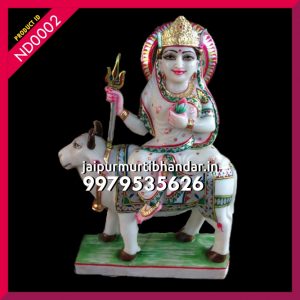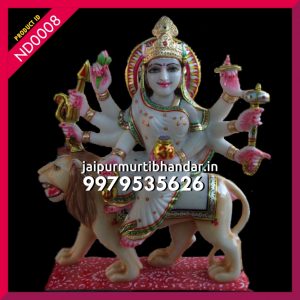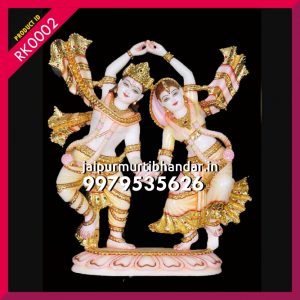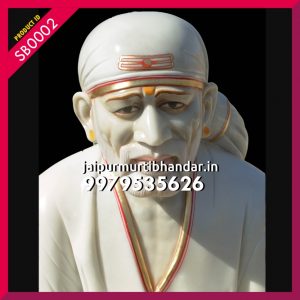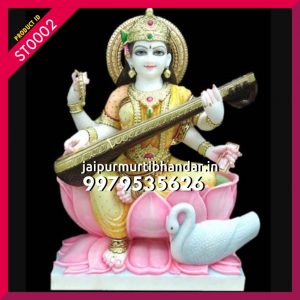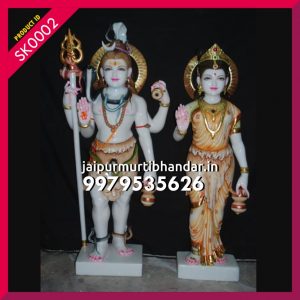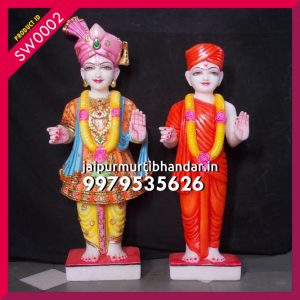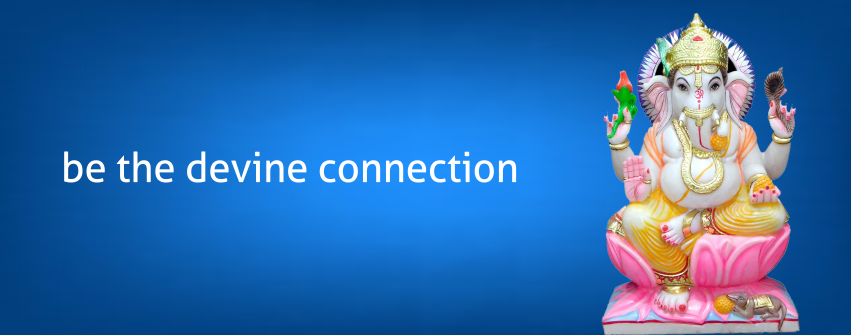
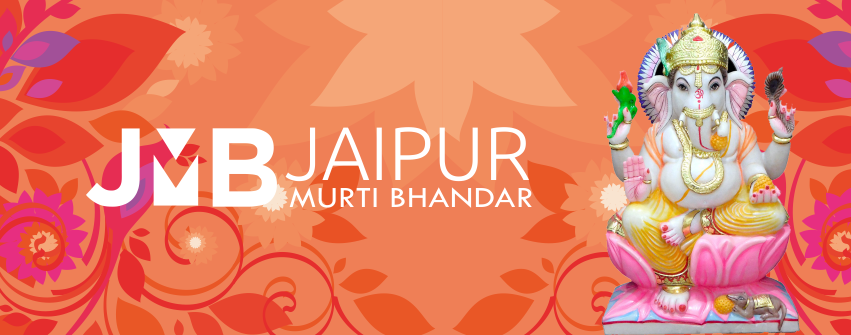
-
Navdurga Maa : ND-0002
Navdurga, are the nine forms of Durga collectively worshipped by Shakti devotees. Scriptures differ in naming the nine incarnations. Pictures and paintings of the Nava-Durga also varies from region to region. The most widely accepted account of the nine forms of Durga is the one found in the Devi Mahatmya ? Sailaputri, Brahmacharini, Chandraghanta, Kushmanda, Skanda Mata, Katyayani, Kalaratri, Maha Gowri and Siddhidayini.
The nine forms of Durga are worshipped during the nine days of Navratri. -
Navdurga Maa : ND-0005
Navdurga, are the nine forms of Durga collectively worshipped by Shakti devotees. Scriptures differ in naming the nine incarnations. Pictures and paintings of the Nava-Durga also varies from region to region. The most widely accepted account of the nine forms of Durga is the one found in the Devi Mahatmya ? Sailaputri, Brahmacharini, Chandraghanta, Kushmanda, Skanda Mata, Katyayani, Kalaratri, Maha Gowri and Siddhidayini.
The nine forms of Durga are worshipped during the nine days of Navratri. -
Navdurga Maa : ND-0008
Navdurga, are the nine forms of Durga collectively worshipped by Shakti devotees. Scriptures differ in naming the nine incarnations. Pictures and paintings of the Nava-Durga also varies from region to region. The most widely accepted account of the nine forms of Durga is the one found in the Devi Mahatmya ? Sailaputri, Brahmacharini, Chandraghanta, Kushmanda, Skanda Mata, Katyayani, Kalaratri, Maha Gowri and Siddhidayini.
The nine forms of Durga are worshipped during the nine days of Navratri. -
Radhs Krishna: RK-0002
Being quality oriented organization, we deal in the manufacture and export of Marble Radha Krishna Statue comprising of Lord Krishna Statue, Marble Radha Krishna Statue, Marble Krishna Statue and Stone Radha Krishna Statue. Lord Krishna and Radha are depicted in their full glory and splendor in these statues. In addition to this, these marble Radha Krishna Statues are available at affordable prices.
-
Sai Baba : SB-0002
Sai Baba was a born to a Brahmin couple of Patri which was in the Nizam state of British India. Where his parents handed over him to the fakir. These were the words revealed by baba in his last days. But Date of birth is still unknown to the world. There are lots of communities who claims that Baba belong to their respective communities but none of them proven.
-
Saraswati Maa : ST-0001
Saraswati’s name means ‘elegant’, ‘flowing’, and ‘watery’ and this is indicative of her status as one of the early Aryan boundary rivers. The Saraswati River (modern name: Sarsuti), just like the Ganges River, flows from the Himalaya and is considered a sacred source of purification, fertility, and good fortune for those who bathe in her waters. The sacred river, again like the Ganges, then developed into a personified deity.
-
Shankar : SK-0002
In the Hindu mythology, Lord Shiva is the Destroyer and the most important one in the Holy Trinity, the other two being Brahma the Creator and Vishnu the Protector. Lord Shiva has always fascinated his followers by his unique appearance: he has not two but three eyes, has ash smeared all over his body, has snakes coiled up around his head and arms, wears tiger and elephant skin, leads a wild life in the cremation grounds far removed from social pretenses, and is known for his proverbial anger..
-
Shivling: SV-0002
We are engaged in exporting the Marble Shivling God. Considering the spiritual value attached to it, we offer our client various kind of Marble Shivling. The ultimate finishing work, perfect cutting and dimensional accuracy offer superb quality statue. Our quality controllers check the product before the final dispatch in the market.
-
Shrinath Ji : SH-0002
Shrinathji?s idol was brought to Rajasthan from Govardhana near Vrindavan to protect it from the hands of the Mughal emperor Aurangzeb who in 1665 was bent upon vandalizing the area of Vrindavan by widespread destruction of Hindu temples. When the Mughal army came to Govardhana, the devotees of the Lord showed them the titles and gifts given to the temple by the previous Mughal rulers. The army commander then ordered the deity to be taken away from Govardhana. For almost six months the statue stayed in Agra after which the custodians of the idol of Shrinathji left that place with the idol in search of a new heaven.
-
Swaminarayan : SW-0002
The Swaminarayan Sampraday began as the Uddhav Sampraday and was led by Ramanand Swami. In 1799, Swaminarayan, born as Ghanshyam Pande, was initiated into the Uddhav Sampraday as an ascetic (Sadhu) by his guru, Ramanand Swami, and given the name “Sahajanand Swami”. At the age of 21, Neelkanth Varni was given the leadership of the sect known as Uddhav Sampraday with the blessings of Ramanand Swami, who handed him control of the religious diocese shortly before his death. Fourteen days after Ramanand Swami died, Neelkanth Varni, now known as Sahajanand Swami, held a large gathering of followers at the town of Faneni. It was during this meeting that Swaminarayan introduced what he termed “the father of all Mantras” and described it as “maha” (or great).[8] Then he was known as Swaminarayan, and the name “Swaminarayan Sampraday” came into existence.
At the age of 49, Swaminarayan took Samadhi at Gadhada in 1830 and died, after he promised to remain within the Swaminarayan Sampraday in the images he installed (and by the Acharyas succeeding him), the Acharyas and saints installed by him (and those in direct succession), the saints he initiated (and those initiated by succeeding Acharyas) and the scriptures, such as Shikshapatri, Vachanamrut, Satsangi Jeevan, Nishkhulanand Kavya and Yamdand (and those authorised by succeeding Acharyas).
-
Vishvakarma : VK-0002
Vishwakarma (Sanskrit for “all-accomplishing, maker of all, all-doer”) is personification of creation and the abstract form of the creator God according to the Rigveda. He is the presiding deity of all Vishwakarma (caste), engineers, artisans and architects.He is believed to be the “Principal Architect of the Universe “, and the root concept of the later Upanishadic figures of Brahman and Purusha.
He is mentioned as the son of K??yapa and Aditi and is said to have made the three worlds with pieces of the Sun god, Surya.

 +91 9979 535 626
+91 9979 535 626